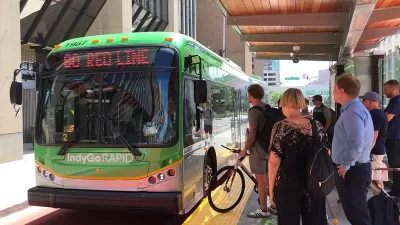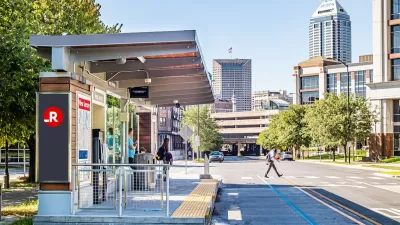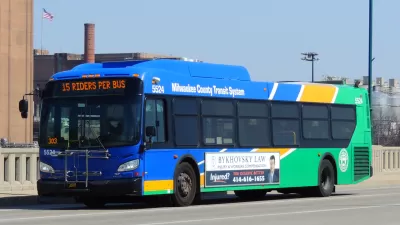In addition to connecting residents to jobs and medical facilities, city leaders hope the BRT line will boost economic development along the route.

Indianapolis city officials hope a new bus rapid transit line will bring economic development to a historically underserved neighborhood, reports Deon J. Hampton. "The Indianapolis Public Transit Corporation’s $188 million Purple Line, a 15-mile bus rapid transit, or BRT, system will eventually run from downtown to the neighboring city of Lawrence, providing access to jobs and healthcare for those who mainly depend on mass transit."
According to the article, the city wants to see new retail space and affordable housing developed along an eight-mile corridor along the new bus route. "In Indianapolis, many low-income residents on East 38th Street, especially those between College Avenue and Post Road in the northeast section of town, support the upcoming project, which would bring new infrastructure improvements such as new drainage and curbs."
However, some critics of the project express concern that the bus line will reduce access to some businesses and put transit farther from some residents by removing some existing bus stops. But proponents of BRT say the line will help low-income residents reach jobs and amenities. According to Scarlett Andrews, director of the city’s Department of Metropolitan Development in Indianapolis, "the city has modified its zoning code specifically for transit oriented development along the bus route in preparation of economic growth and connectivity along East 38th Street, a section of which has underutilized strip malls, declining housing developments and has turned into a center for public safety issues."
FULL STORY: Indianapolis looks to mass transit project to spur development in low-income area

Maui's Vacation Rental Debate Turns Ugly
Verbal attacks, misinformation campaigns and fistfights plague a high-stakes debate to convert thousands of vacation rentals into long-term housing.

Planetizen Federal Action Tracker
A weekly monitor of how Trump’s orders and actions are impacting planners and planning in America.

San Francisco Suspends Traffic Calming Amidst Record Deaths
Citing “a challenging fiscal landscape,” the city will cease the program on the heels of 42 traffic deaths, including 24 pedestrians.

Defunct Pittsburgh Power Plant to Become Residential Tower
A decommissioned steam heat plant will be redeveloped into almost 100 affordable housing units.

Trump Prompts Restructuring of Transportation Research Board in “Unprecedented Overreach”
The TRB has eliminated more than half of its committees including those focused on climate, equity, and cities.

Amtrak Rolls Out New Orleans to Alabama “Mardi Gras” Train
The new service will operate morning and evening departures between Mobile and New Orleans.
Urban Design for Planners 1: Software Tools
This six-course series explores essential urban design concepts using open source software and equips planners with the tools they need to participate fully in the urban design process.
Planning for Universal Design
Learn the tools for implementing Universal Design in planning regulations.
Heyer Gruel & Associates PA
JM Goldson LLC
Custer County Colorado
City of Camden Redevelopment Agency
City of Astoria
Transportation Research & Education Center (TREC) at Portland State University
Jefferson Parish Government
Camden Redevelopment Agency
City of Claremont





























